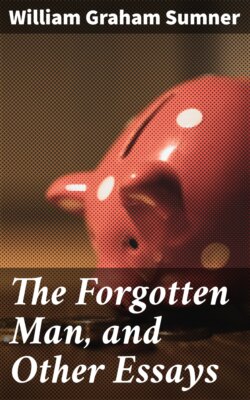Читать книгу The Forgotten Man, and Other Essays - William Graham Sumner - Страница 56
На сайте Литреса книга снята с продажи.
(R) That Protectionism Produces some Great Moral Advantages.
Оглавление136. It is a very suspicious thing when a man who sets out to discuss an economic question shifts over on the “moral” ground. Not because economics and morals have nothing to do with each other. On the contrary, they meet at a common boundary line, and, when both are sound, straight and consistent lines run from one into the other. Capital is the first requisite of all human effort for goods of any kind, and the increase of capital is therefore the expansion of chances that intellectual, moral, and spiritual good may be won. The moral question is: How will the chances be used? If, then, the economic analysis shows that protective taxes lessen capital, it follows that those taxes lessen the regular chances for all higher good.
137. It is argued that hardship disciplines a man and is good for him; hence, that the free traders, who want people to do what is easiest, would corrupt them, and that protectionists, by “making work,” bring in salutary discipline for the people. This is the effect upon those who pay the taxes. The counter-operation on the beneficiaries of the system I have never seen developed. Bastiat said that the model at which the protectionist was aiming was Sisyphus, who was condemned in Hades to roll a stone to the top of a hill, from which, as soon as he got it there, it rolled down again to the bottom. Then he rolled it up again, and so on to all eternity. Here then was infinity of effort, zero of result; the ultimate type to which the protectionist system would come. Somebody pitied Sisyphus, to whom he replied: “Thou fool! I enjoy everlasting hope!” If Sisyphus could extract moral consolation from his case, I am not prepared to deny but that a New England farmer, ground between the upper millstone of free competition, in his production, with the Mississippi Valley, and the nether millstone of protective taxes on all his consumption, may derive some moral consolation from his case. There are a great many people who are apparently ready to inflict salutary chastisement on the American citizen for his welfare—and their own advantage.
138. The protectionist doctrine is that if my earnings are taken from me and given to my neighbor, and he spends them on himself, there will be important moral gains to the community which will be lost if I keep my own earnings, and spend them on myself. The facts of experience are all to the contrary. When a man keeps his own earnings he is frugal, temperate, prudent, and honest. When he gets and lives on another man’s earnings, he is extravagant, wasteful, luxurious, idle, and covetous. The effects on the community in either case correspond.
139. The truth is that protectionism demoralizes and miseducates a people (§§89, 153, 155). It deprives them of individual self-reliance and energy, and teaches them to seek crafty and unjust advantages. It breaks down the skill of great merchants and captains of industry, and develops the skill of lobbyists. It gives faith in monopoly, combinations, jobbery, and restriction, instead of giving faith in energy, free enterprise, public purity, and freedom. Illustrations of this occur all the time. Objection has been made to the introduction of machines to stop the smoke nuisance because they would interfere in the competition of anthracite and bituminous coal. People have resisted the execution of ordinances against gambling houses because said houses “make trade” for their neighbors. The theater men recently made an attempt to get regulations adopted against skating rinks—purely on moral grounds. The industries of the country all run to the form of combinations.25 Our wisdom is developed, not in the great art of production, but in the tactics of managing a combination, and while we sustain all the causes and all the great principles of this system of business we denounce “monopoly” and “corporations.”
